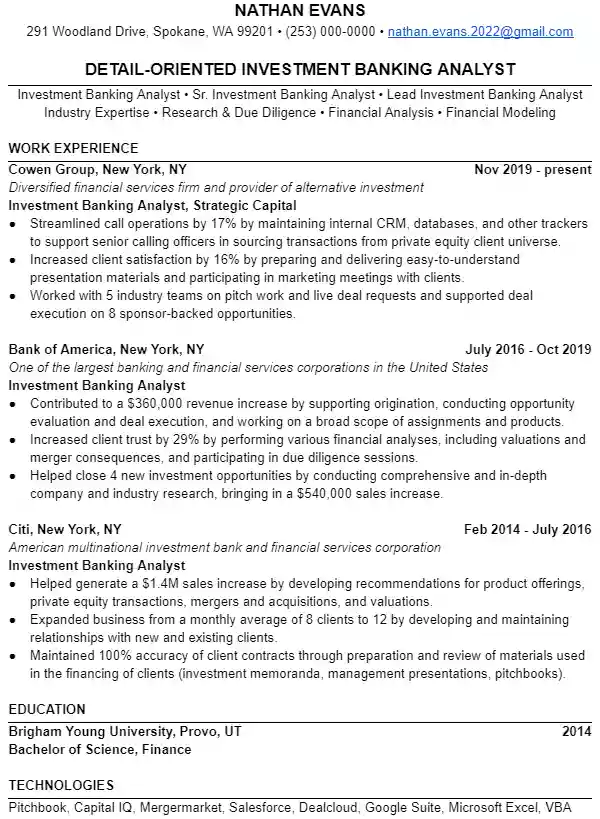Investment Banking Resume Example
This guide will teach you how to write a great Investment Banking resume. Don’t have time right now? Leet Resumes can write it for you free of charge.


How to write a great Investment Banking resume
They say time is money. Ironically, the majority of your time is spent focusing on dollars and finances.
Investment Banking isn’t for everyone, but you’re not just anyone. Sure, you’re good with numbers, but it takes much more than that to succeed as an Investment Banker.
You’ve seen countless colleagues come and go, so what do you have that they don’t? Grit. Tenacity is just as vital to a successful Investment Banker as financial acumen.
Hollywood may depict Investment Bankers as party animals and fat cats, but the movies don’t show the long hours, nasty phone calls, and constant competition.
It’s true, Investment Bankers can earn a lot of money - but no one is going to do the work for you. You get what you put in.
In this line of work, results speak volumes and the thin-skinned just don’t last very long.
You know a thing or two about making a sale, but you also know your worth. The first step to landing more job interviews and career options is an eye catching Investment Banking resume.
Need some help? Just follow our simple, step-by-step guide for creating a fantastic Investment Banking resume.
Leet Resumes can always write your resume for you - free of charge!
Why a great Investment Banking resume means more job interviews
Putting together a compelling, concise resume is like crafting the right sales pitch.
You’re still selling equity, only this time it's your own equity.
Investment Banking is competitive when you have a job, let alone trying to get your feet in the door somewhere else.
You’re going to be competing with a lot of other job candidates, and many of them will have Ivy League schools plastered all over their resumes.
Your resume has to be as persuasive as you are while on the phone with leads.
A great resume always features two elements: Clarity and conciseness. Readers need to immediately know who you are and why you’re a must-interview candidate.
How to format your Investment Banking resume
Let’s face it, you have things to do. You don’t have time to spend countless hours agonizing over every little resume detail.
The good news is you don’t have to.
Just follow our resume format, it will simplify and speed up the entire resume writing process.
Ready? Here it is:
- Name + Contact
- Professional Headline
- Professional Summary
- Work Experience
- Education
- Keywords
Almost seems too straightforward and easy to be true, right? Life is complicated enough, the least we can do is simplify resumes.
Now that we’ve laid out the basic format, let’s touch on each section in greater detail. By the end of this article you’ll be a resume writing expert.
Important resume guidelines
Before we get into the nuts and bolts of resume writing, let’s stop and talk about some big picture stuff.
We’ve already touched on the importance of keeping things short and sweet, but it’s worth mentioning again.
Brevity is key here! Recruiters and hiring managers see countless resumes over the course of a single day. They don't have time to read paragraphs. Never use paragraphs anywhere on your resume.
On a related note, avoid using colors besides black ink. You don’t want your resume to look like a children’s art project. Similarly, extra text boxes or columns are unnecessary and should be avoided.
We want your resume to be crisp, clean, and immediately readable. At the end of the day, additions like extra columns and colors just make it harder for recruiters to decipher your resume.
Name + Contact
To start, just write your name in larger text at the very top of your Investment Banking resume. After your name comes your professional email and phone number. Always keep all of this information professional; no nicknames, silly emails, etc.
You can also add your LinkedIn profile, but only if you check it regularly. You don’t want to miss out on a job interview because you missed a notification.
Professional Headline
Now it’s time to start giving your resume some real personality. Consider your Professional Headline your first impression. In other words, it’s important!
Using just 3 to 5 words, this section should tell readers a little something about your workstyle and career thus far. This is your opportunity to capture their attention.
Here’s a tip. Begin with a positive adjective, and then add a description of your current role/level. For example: “Dedicated Investment Banker” or “Tenacious Investment Banking Analyst”.
Professional Summary
Now that you’ve hooked their attention, it’s time to start listing your qualifications and achievements. A resume is no time to be modest. Readers need to know why you’re the best option for the job.
Your Professional Summary will help you accomplish just that using only 2 to 4 lines (and no sentences!). The first two lines are essential, but the last pair are optional depending on your experience level.
Line one: List a handful of position titles and jobs you want to accept as your next role. For instance, “Senior Investment Banker”. Keep in mind that these don’t have to be jobs you’ve held in the past or currently hold. These are the jobs you want to succeed in next.
Line two: Here you’ll write down the most desirable Investment Banking skills and abilities you bring to the table. Debt issuance, financial modeling, excellent communicator, etc.
Line three: If you have enough experience, you can use line 3 to list some of your biggest Investment Banking achievements and accomplishments like successful IPOs, mergers & acquisitions, etc.
Line four: Also optional, line 4 can list any relevant promotions or awards you’ve earned during your career.
Still feeling unsure about this whole resume-writing plan? Remember, Leet Resumes can always write your resume for you.
We’ve written thousands of great resumes, and we’re ready to write yours for free!
Work Experience
Plenty of people think they know what to write in the Work Experience section of their resume, but plenty of people are wrong.
Don’t fall into the same resume writing trap as so many other applicants.
Let’s start from the top. This area is for listing your relevant job history in reverse chronological order. Your part-time job from high school shouldn’t be mentioned. Under each position you list, add a few bullet points detailing your time spent on the job.
Simple enough, right? In theory, yes, but keep these important tips in mind.
Focus on your biggest successes
Don’t make the common mistake of just listing each job’s expected duties and responsibilities. Recruiters already know what an Investment Banking job entails, they want to know if you can do it!
Instead, set yourself apart from the crowd by focusing on your biggest career wins and achievements. If you oversaw a major merger or IPO, include that! If you’re responsible for a large number of clients, or bring in tons of capital, now is the time to brag.
Add numbers everywhere
You understand numbers better than most, so this tip should resonate.
What’s the best way to validate those successes we just mentioned? By quantifying them.
What’s your average return on investment percentage? How many clients do you work with, and how much money did you raise for them?
Your Work Experience section should include as many numbers, statistics, and metrics as possible. Words can be misunderstood, but numbers tell a clear story (that ends with you getting more job interviews).
Always mention promotions
If you’ve been promoted while working in Investment Banking, don’t be shy about it!
Promotions tell recruiters and hiring managers that you’re good at what you do, and decision makers in the industry have already taken note.
Education
Starting to feel some resume writing fatigue? Push through it! We’re almost done!
The education section will be short. All you need to add here is any institutions you’ve attended, as well as any degrees or certificates you’ve earned.
If you’re still in school, or currently enrolled in an academic program of any kind, don’t put it on your resume. The only exception to this rule is if you’re due to graduate in a matter of weeks or a few months. In that case, write “anticipated graduation in May 2023,” for example.
Keywords
Last but certainly not least comes the keywords section. This area is for sprinkling in any additional Investment Banking hard skills, soft skills, or awards that you haven’t mentioned already.
Here are a few examples:
- Debt issuance
- Tireless work ethic
- Persuasiveness
- Financial data analysis
- Private equity settlements
Leet Resumes is here to help
Still on the fence about writing your own resume? Why not let Leet Resumes write you a personalized resume for free! (tips appreciated)
We’re resume writing experts, and we’re ready to help you take your Investment Banking career to the next level.










